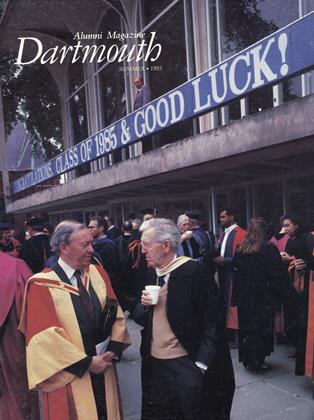THE CROWN PRINCE by John Barchilon '60 W.W. Norton & Company, 1984, 432 pp., $15.95.
Paul Wittgenstein, Austrian concert pianist and brother of philosopher Ludwig Wittgenstein, is chiefly remembered today for the works he caused to be composed. Suffering the loss of his right arm in World War I just months after his successful concert debut in Vienna, he joined the ranks of history's one-armed pianists with maniacal determination, carving out a left-handed repertoire that stands today as a monument to his industriousness. Significant works by Ravel, Prokofiev, Richard Strauss, Janacek, and Britten, as well as compositions by more minor figures like Gottschalk and Korngold, owe their exsistence to Wittgenstein - who died in this country in 1961 after a long career as pianist and pedagogue.
What we may take to be the central event in Wittgenstein's life - the amputation, and the subsequent restructuring of his concert career - carries the kind of emotional charge that one would have thought a novelist or screenwriter would long since have appropriated. Not so, found John Barchilon '60, writer, doctor, veteran, and piano student, who saw in the outlines of Wittgenstein's life a story that drew together his own interests and experience.
In the early pages of The Crown Prince there is some rough going. The prose seems a bit purplish; the novelist seems to take dramatic licenses (killing off brother Ludwig as a child) that serve no descernible plot function. One begins to think, "Oh, it's going to be that kind of novel." But the author has warned that it is not to be taken as a factual representation of the pianist's life, and as the plot carries the reader along, it becomes clear that Barchilon's Wittgenstein is the son of Parson Weems' George Washington, second cousin to Clifford Irving's Howard Hughes - a larger-than-life figure who only shares name, vocation, and arm with his historical namesake.
This Wittgenstein is the clean-cut, mischievous, womanizing, naive-butultimately-right-thinking hero beloved of American literature, but here transplanted to the Western front. Endowed with the nearly-inhuman ability to play two-handed piano works with one hand even before his accident, he takes Viennese society by storm, loves the wrong woman for the wrong reason, and survives most of the War on luck and wits. He meets the shell with his name on it carrying out an act of compassion, handles societal upheaval, influenza pandemic, and a demolished career by equal parts determination, quick-thinking, and love, and emerges a stronger man at the end.
Barchilpn's forte is taking his own knowledge and using it to make the implausible seem possible. Wittgenstein's long search to correct the defects in his one-armed technique and make one hand sound like two in most of the standard repertoire - a good parlor trick, but nothing you could ever fool the critics with - is carried out like a textbook exercise in biomechanics (Barchilon practices sport medicine). Equally effective are his scenes revolving around medicine on and off the battlefield.
One hilarious episode, a description of Richard Strauss' home life, actually sounds much more exaggerated than the facts behind it would indicate (Frau Strauss was one of the music world's notorious harpies).
On a minor note, it is a shame that Norton's editors, so scholarly when it comes to works of music fact, should let the author down on a number of musical points (the equivalence of G-sharp and A-flat, the use of Chopin's name where Beethoven's was clearly meant) so easily correctable. These don't matter to the non-musician, but would add to the believeability of an admittedly tall tale. In short, this is pure movie material and a good yarn to take to the beach with you this summer.
 View Full Issue
View Full Issue
More From This Issue
-
 Feature
FeatureA Humanist Ponders the Future of Liberal Education
June 1985 By Charles T. Wood -
 Feature
FeatureAn Apple on Every Desk
June 1985 By Fred Pfaff '85 -
 Feature
FeatureThe Great Train Robbery
June 1985 By Fred Pfaff '85 -
 Feature
FeatureThe Wentworth Bowl
June 1985 By Barbara J. MacAdam, Curator, Hood Museum of Art -
 Cover Story
Cover StoryValedictory Address
June 1985 -
 Feature
FeatureReunions 1985
June 1985 By Robert Frost
Books
-
 Books
BooksPRIVATE.
DECEMBER 1970 By HENRY B. WILLIAMS -
 BOOKS
BOOKSParty Crasher
MAY | JUNE 2018 By JULIA M. KLEIN -
 Books
BooksSTRUCTURAL PRINCIPLES IN OLD ENGLISH POETRY.
JANUARY 1969 By L. DEAN PEARSON -
 Books
BooksINDUSTRIAL RESEARCH AND TECHNOLOGICAL INNOVATION: AN ECONOMETRIC ANALYSIS.
DECEMBER 1968 By M. O. CLEMENT -
 Books
BooksROBERT FROST 100: A CENTENNIAL PUBLICATION.
December 1974 By STEARNS MORSE -
 Books
BooksTHE PAGEANT OF AMERICA
AUGUST, 1928 By W. R. Waterman

